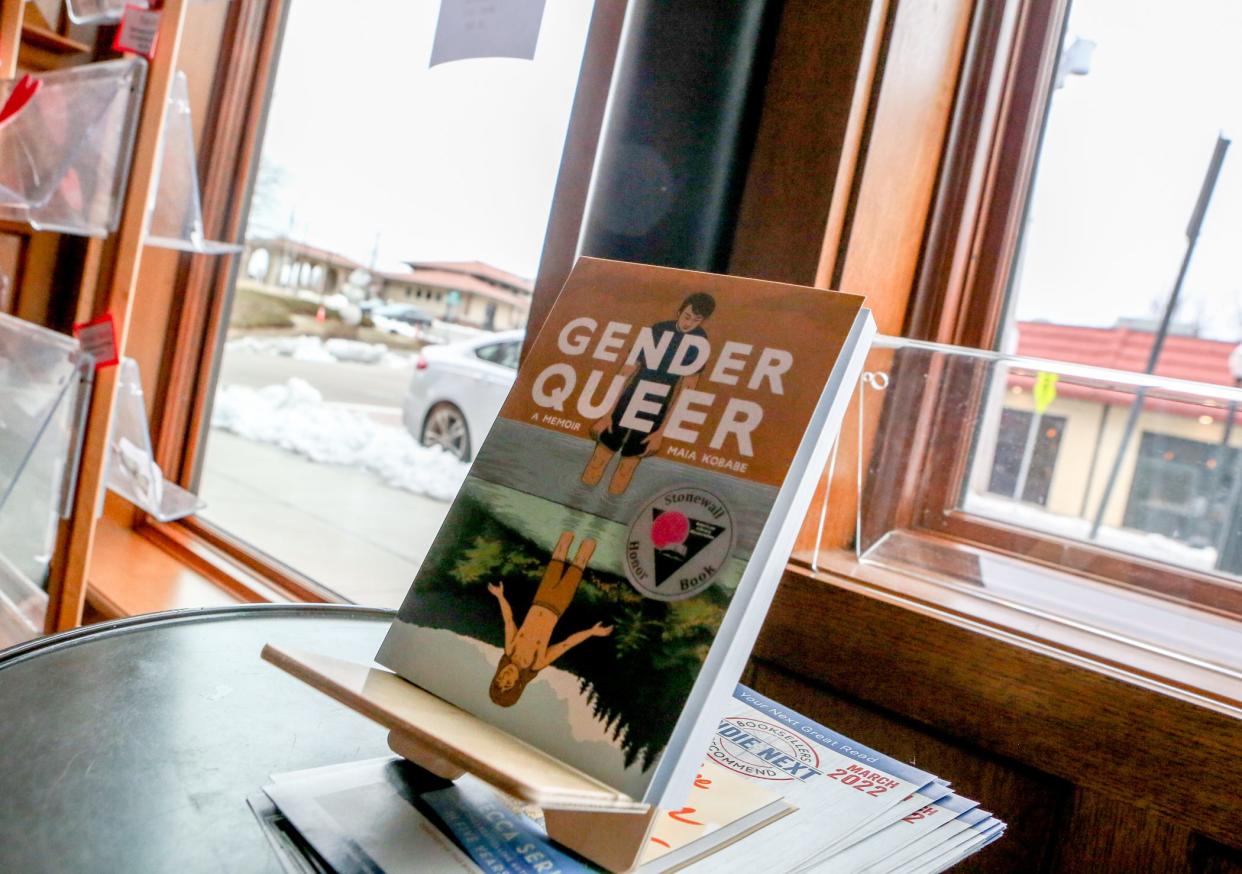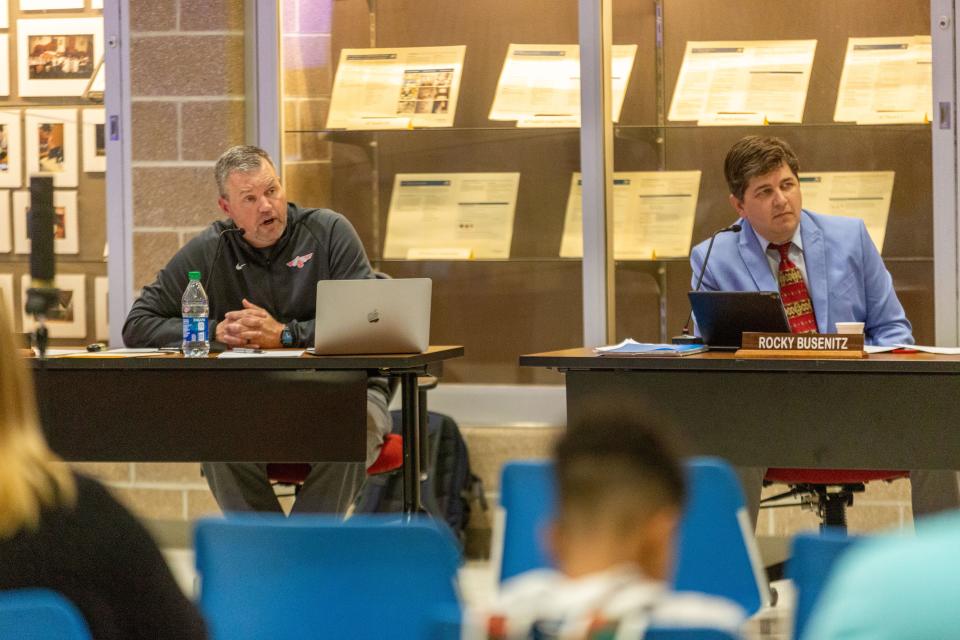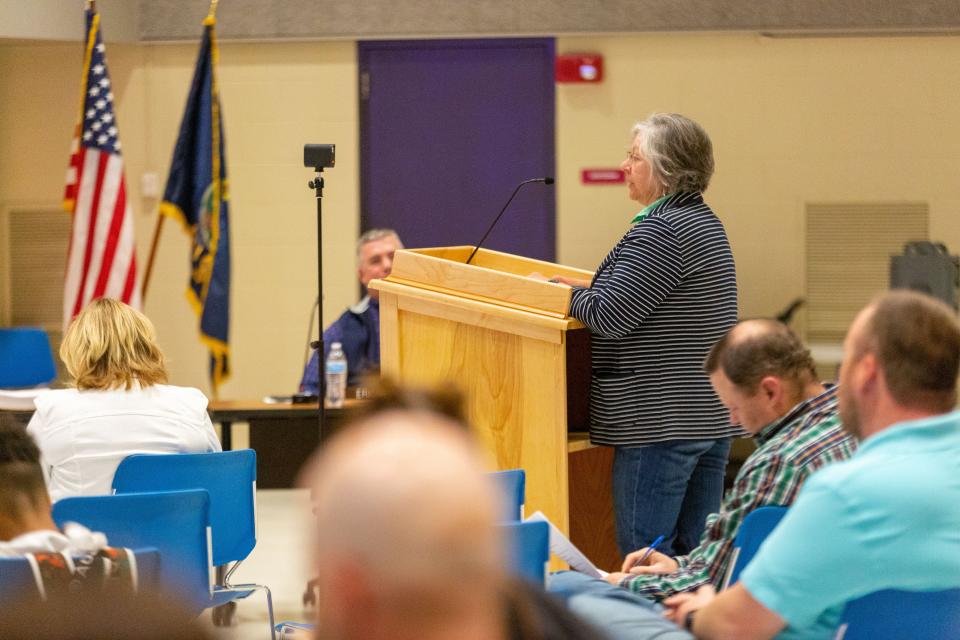Shawnee Heights among Kansas school districts divided on debate to ban 'inappropriate' library books

For Geri Cummings, there's historical precedent for the situation playing out in Shawnee Heights High School's library.
It was May 10, 1933, that hundreds of Nazi-sympathetic students burned tens of thousands of books they deemed as "un-German" across the country, she told the Shawnee Heights Board of Education on Monday.
The books included works by authors such as Jack London and Helen Keller — books Cummings said championed social justice for disabled people, better working conditions for rights for women. Banning and burning those books, then, was "simply a fundamental repression of ideas."
"German poet Heinrich Heine said, 'Where books are burned, in the end, people will be burned,'" said Cummings, whose children and grandchildren have attended USD 450 schools. "He said that in 1821. History has proven this. But we have people who want to whitewash history, and they don't want history based on facts."
Cummings was relating the Nazi book burnings in 1933 to Shawnee Heights USD 450 in 2022, where a memoir about the experience of a gender nonbinary author has garnered criticism and challenge. The debate in the Topeka-area district comes as school communities across the state and nation scrutinize books in their libraries at the behest of parents.
More: Teacher vacancies continue to rise in Kansas, and it may require 'out-of-the-box' solutions
A state legislator is among those who have requested Shawnee Heights remove the 2019 book "Gender Queer" from the shelves at the district's high school library.
The comic-book like autobiography outlines the coming of age of its author, Maia Kobabe, who identifies as asexual and gender nonbinary.
But several depictions of gay sex acts in the book have garnered complaints that it is akin to pornography, leading to it being challenged in at least 11 states, making it one of the most banned books in the country.
‘Gender Queer’ among five books challenged
Sen. Rick Kloos, R-Berryton, said he has received over 40 emails from parents in recent weeks expressing concern about the text, causing him to call on school administrators to pull the book from circulation.
In an interview, Kloos added he has met with Shawnee Heights superintendent Tim Hallacy on the matter.
"It wasn't, to me, a heterosexual/homosexual issue," Kloos said. "From a parent, grandparent guardian, I just feel like the contents were inappropriate."
"Gender Queer" is among five books currently being formally challenged by parents in Shawnee Heights, Hallacy told The Capital-Journal.
The other books at issue include an elementary school book about race, called "It's Not My Fault: A Story of Whiteness" to a popular young adult book "The Hate U Give," which tells the story of a Black teenager whose friend is fatally shot by police.
Like several other districts in the Topeka area and across the state, Shawnee Heights has long maintained a little-known board policy that outlines a process for challenging books and learning materials in the district.
That policy calls for district patrons finding issue with a book or other instructional material to first bring the matter up with a principal.
More: How effectively is Topeka sharing its Black history? Educators, historians share contrasting views.
Should that fail to resolve the issue, principals are required to escalate the matter to the superintendent's office through a written complaint form, at which point a six-person district committee — made up of a librarian, teachers, administrator and parents — reviews the material for its instructional value. They then make a recommendation to the school board, which has the final say on keeping or removing a book, within 30 days.
In the 18 years the policy has been in existence at Shawnee Heights USD 450, Hallacy said to his knowledge, instructional material challenges have never risen to the point of reaching a review committee.
"In 30 years of public education, I've never seen challenges like this," he said. "And we know it's happening all over the country."

Book banning debate spreads across Kansas districts
Indeed, school officials statewide are facing similar objections from parents and legislators are airing their objections, even during committee hearings.
In November, officials at Goddard USD 265 made headlines when they ordered 29 books be removed from circulation, including such well-known texts as "The Handmaid's Tale" by Margaret Atwood and "The Bluest Eye" by Toni Morrison.
The move was not necessarily permanent, the district said at the time, but was intended as a stopgap while a committee was formed to determine the material's suitability.
In Salina, a local school board meeting turned heated when parents objected to being limited in the time they could present on the possible removal of "All Boys Aren't Blue," a young adult memoir detailing author George Johnson's experience growing up as a queer Black man.
During a legislative hearing last year, lawmakers and members of the public pointed to objectionable materials they had found in school libraries.
Sen. Renee Erickson, R-Wichita, pointed to "Gender Queer" at Shawnee Heights and said if she found the images depicted in the book on the computer of a colleague, she would have had that person reported for possessing child pornography.
More: Kansas governor signs new legislative, board of education maps, with legal challenge possible
"It is shameful," she said.
At Monday's Shawnee Heights Board of Education meeting, no community member advocated for removing "Gender Queer" or any of the other books being challenged.
Instead, three people, including Cummings, spoke against what they said were attempts by Kloos and other conservative politicians to censor materials in schools.
Debate comes as ‘parents bill of rights’ vetoed
But newly-installed board member Christina Flaming said the board could be setting a double standard if it continues to block offensive content in students' internet connections but not remove the challenged books from circulation.
"Are we causing harm to our own reputation as a public school (district) by clinging so tightly to this censorship idea, when there's probably quite a few family members in our school district who don't really want their kids exposed to this at some of the ages they're being exposed?" Flaming asked her fellow board members.
Flaming said she wanted to find some middle ground between keeping potentially offensive books and protecting kids "who might be traumatized by this stuff."
"I personally do not vote for ripping books out and burning them out in the parking lot," she said. "I don't, but some parents want everything available, and some parents don't want everything available."
Board vice president Rosa Cavazos pointed out that the district already allows parents to opt their children out of being able to access certain materials. Cavazos took issues with calls for the board to circumvent its own policies and immediately remove the challenged books.
More: Randy Watson apologizes for Native American remarks, vows to do better by struggling students
"I appreciate the process that we're doing, and I don't believe in an ultimatum," she said. "I believe that we need to continue to go through the process and have everything come to us, so that as a board, we can decide what is best for the district.”
Kansas districts have banned 30 books in recent months, according to a report from the PEN America Foundation, a national group that advocates for free speech. The organization notes a marked rise in the number of bannings nationally, as well.
The debates come at a time when Republican legislators have pushed a so-called "parents' bill of rights" designed to give parents more review power over books and materials in schools.
Vetoed by Gov. Laura Kelly on Friday, the measure would have allowed for parents to challenge the "material or educational" benefit of books or resources in a school library, with a successful appeal resulting in the item's removal.
But a similar process already exists in most districts, resembling what is done at Shawnee Heights, Mark Tallman, a lobbyist for the Kansas Association of School Boards said.
"I think in our view, that it makes sense, it's something we've recommended," Tallman said. "We assume most districts, if not all districts, would have something like that already in place. And so in that sense, we did not see (the parents' bill of rights) as a major change."
‘Public school is all inclusive’

Kloos, however, has said he is disappointed Shawnee Heights is not removing "Gender Queer" from its shelves while the its contents are being reviewed.
"Why couldn't you just take it out for now until the process happens?" he said. "He is the superintendent, I would think he would have some leeway on that. Just say 'Hey, board, we got a lot of controversy right now. Let's at least pull it until they're reviewed."
But to Hallacy, trusting the process is important.
"It is an emotionally charged issue," he said. "It does have political overtones to it. You want to be transparent. You are dealing with the most important thing in the world, and that's people's children. And so you want a good, thorough process."
In speaking with the Shawnee Heights school board, Cummings, the grandma, was more emphatic that politicians should have no role in deciding what materials are on school shelves.
"That should be left to people who have master's degrees in education and library science," Cummings said. "Public school is all inclusive. It is available to all. And if these people don't want their kids to learn from books for everyone, then there's plenty of private schools that they can send their children to.
"Public school was founded so that children can learn more than what their parents could actually teach them," she continued. "If the book that people are objectionable to is uncomfortable to them, too bad."
Andrew Bahl is a senior statehouse reporter for the Topeka Capital-Journal. He can be reached at abahl@gannett.com or by phone at 443-979-6100.
Rafael Garcia is an education reporter for the Topeka Capital-Journal. He can be reached at rgarcia@cjonline.com. Follow him on Twitter at @byRafaelGarcia.
This article originally appeared on Topeka Capital-Journal: Book banning debate rages in Shawnee Heights, Kansas districts

